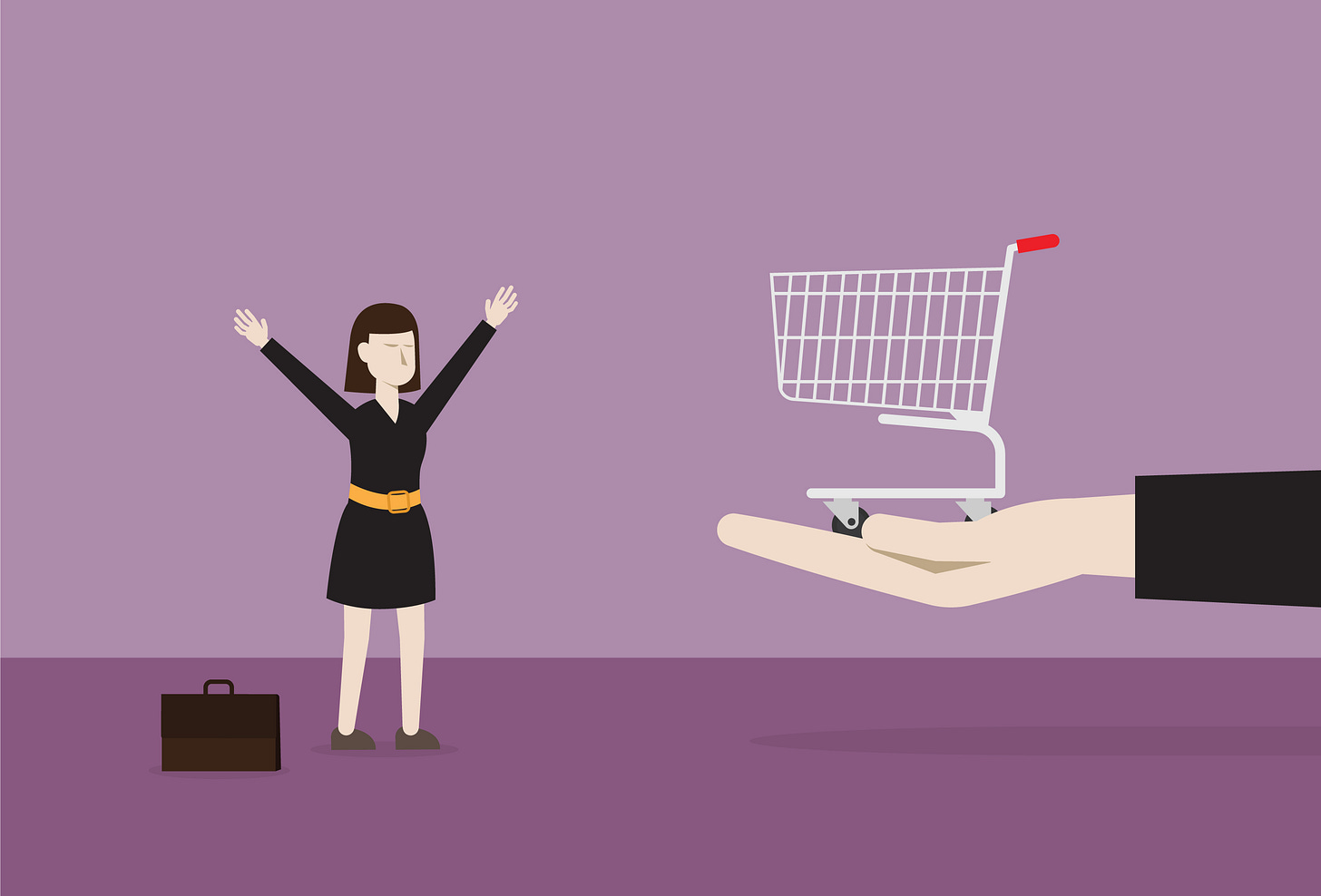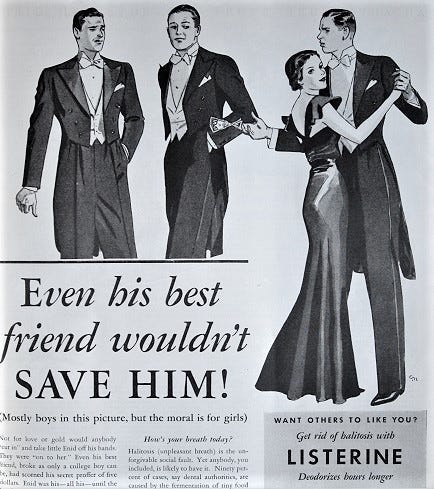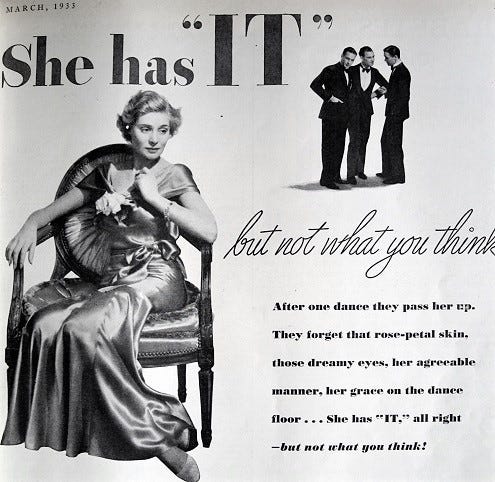The Shopping Cure
This is the midweek edition of Culture Study — the newsletter from Anne Helen Petersen. Paid Subscribers: If you haven’t activated your invitation to Sidechannel, email me for a new one. New topics this week: #garden-outdoor-fixit and #kin-chosen-family-divorce-community. And, of course, Bennifer 2.0.
When I was at my most burnt out pre-pandemic, traveling constantly for reporting, working all the time, the muscle under my eye twitching almost constantly, still without the language to describe what I was doing to myself, the one thing that would temporarily calm me down was buying shit.
Not in massive quantities, and not clothes. Just things that seemed like they would fix small problems, fill small lacks: a puzzle dog bowl, a lemon squeezer, an extra set of sheets because operating with one is a recipe for sleeping at least one night on the mattress pad, a pair of headphones to replace the broken ones, a bathroom drawer organizer, a couch de-piller.
None of these purchases were pressing or even, ultimately, necessary. They were a coping mechanism: a moment of fleeting calm within the larger, barely controlled chaos. They also required just the right amount of decision-making and, thanks to the way we now shop online, almost no friction — at least in the moment. The disposal of the cardboard boxes, the hassle of returns, all of that was a problem for Future Me.
There’s a similar dynamic at play in the desire to go to Target and drop $82 on things that weren’t on your list, in part because you didn’t have a list, because you just wanted to go to Target and encounter solutions for problems you didn’t know you had. This craving is the capitalist long-game: continually surface new struggles while also conveniently providing consumerist solutions to them.
For me, the most cogent illustration of this phenomenon is halitosis, a fake medical word devised by Listerine to market its antiseptic liquid, previously used to treat bacterial infections, as an everyday necessity. The company created an anxiety (bad breath, which affects your social life and standing) and proffered the solution (our product).
Same for Lux Soap, only with body odor — these ads are everywhere in 1920s and ‘30s fan magazines, just straight up targeting women with desirability anxiety. The one below, from 1933, plays on the popularity of the massively popular Clara Bow movie It — in which “it” was sex appeal. Here it’s….B.O.
These are textbook examples, the sort so transparent you think how were these people so naive, a company told them they had a problem and they just believed them. But consider Big Pharma, and Big Skincare, and Big Design & Renovation, and Big Tech, and Big Home Remodel, Big Fitness & Wellness, and Big Fashion. None of these industries actually solve the problems they present as pressing, although they certainly purport to. Their products will, however, get you just close enough to catharsis (of completion, of solving your problem, of “fixing” whatever you discovered was broken) that you build faith in a brand as solution — convinced that if you just get the next version, research a bit more, actually take the Wirecutter rec, at least one hole in the leaky bucket of your life will be plugged.
I am not going after anyone for this behavior. I am looking straight in the damn mirror at this behavior. I had a brief respite from it last year, a few months into the pandemic, when I didn’t feel like buying stuff, any sort of stuff. For a brief moment, the risks and harm of the supply chain, purposefully blurred by the companies that profit from our purchases, came into focus. Friction re-entered the shopping experience. I felt optimistic about a potential shift in American attitudes towards consumption.
But then the summer came, and that friction began to disappear. I funneled my enduring pandemic anxiety into leveling up my lawn dad status — and as any lawn dad will tell you, any level of lawn-dadding requires items. Potting soil and fertilizer and Neem oil; a shovel and a spade and a weed whacker; pots and more pots and hanging pots.
Some of these items are one-time purchases; others require constant refreshing. The string runs out of the weed whacker. You always need more mulch. You didn’t buy nice enough clippers and now they’re dull and actually don’t you probably need a lopper? If you get a dandelion tool, maybe that will fix your dandelion problem? Will the special azalea fertilizer fix your blighted leaves? Part of the pleasure of gardening is solving problems. But the logic of consumption transforms gardening into yard work: a task, a weight, another task at which to find yourself lacking.
This might sound ridiculous, because a garden, a yard, a home — at least in contemporary capitalism — are eminently desirable, the ultimate bourgeois end goal. But once obtained, they transform into sources of ever-proliferating problems: a wack-a-mole of to-do lists, dark pits into which your money disappears with little to no effect. For so many, they cannot just be. Within the logic of capitalism, they are insufficient in and of themselves. They demand fixing, but they are never truly fixed.
This ethos holds true across bourgeois hobbies and lifestyles. Running, cooking, sewing, raising a small child, raising a less small child, raising a dog, traveling, gaming, “getting really into wine,” “getting really into cocktails,” “getting really into baking,” fly-fishing, skiing, hunting, meat smoking, four-wheeling, kayaking, stand-up paddle-boarding, yoga, golfing, gardening, backpacking, camping, scrapbooking, guitar — these activities accelerate, invite more investment, both literal and figurative, and cut across regions and the urban/suburban/rural divide. They seep into all the different shades and distinctions of middle-class life. They transform from sites of actual pleasure and diversion to means of self-betterment, performance, and constant improvement, even if that “leveling up” is manifested solely through the constant acquisition of gear.
And before you say that many of these activities — including home maintenance — can, indeed, be performed at little to no expense: of course they can. But that’s not the way most of us been trained to approach leisure, lifestyle, ownership or even our own bodies. Nothing is just fine as it is. Everything demands maintenance and, preferably, amelioration — and then more maintenance in its ameliorated form.
You buy the tools for backpacking, go once, and then spend months thinking about a new item you can purchase to deepen your enjoyment of the backpacking experience. There are a few small things that actually make backpacking better (a quality pack, a warm enough sleeping bag, a good dehydrated meal, a flask, a hammock, a workable lightweight stove) but a lot of things are just REI selling you an image of an streamlined backpacking experience that doesn’t actually exist (or that does exist, and it’s called car camping).
Or consider “home improvement.” The exterior door to my house was from the time of construction, in 1959. Two winters ago, a set of blizzards were so fierce that snow began to regularly accumulate inside the house. Okay, so new exterior door — which requires new exterior trim, and then hey why don’t you repaint and replace the water damaged carpet, but if you replace the carpet, probably should go all the way up the stairs with it, and then you’re reminded that the old baby gate from the previous owners has been banging up the trim, someone should probably repaint that too, but should you use the old painters or do itself, do you have time or do you need to work more to buy that forsaken new door, god I’m so bored, has a brain ever been more boring than my own while contemplating home improvement options, and yet this will never end.
The envelopment and distraction inherent to these projects — and their normalization through reality TV and fix-it media — makes it all the more impossible to even imagine a different way of organizing one’s life. “Freedom” and “choice” present themselves as the “freedom” to choose between various products; those choices then fill the void where personality or community might have been. It’s very difficult, in other words, to push back on capitalist imperatives (of family, of career, of existence) when your browser keeps freezing from too many West Elm tabs and skincare companies are trailing your every move on Instagram.
This is the ballad of aspirational bourgeois existence. It is not actual precarity. It is just an existential mind-fuck, a creepy funhouse of despair packaged in online shopping carts with free shipping if you just sign up for free emails, and it extends far into the corners of our homes, onto our bodies, in leisure pursuits, and the way we raise our children. As soon as you arrive at the ideal, you are confronted with new, diverting modes of continued improvement, few of which position themselves as “optional” and all of which demand upfront and continued investment.
As evidenced by my previous post on middle-class aesthetic maintenance, this is part of a larger posture I’ve been prodding. What happens when you realize that the animating theme of the rest of your life, without intervention, is dying your hair and breaking down a continuous stream of cardboard boxes? We used to call this a midlife crisis. But I think it’s always been more of a capitalist reckoning. All of this shit — and for what?
Which returns us to the dumb purchases I would make at 7 pm in a hotel room while eating a broccoli and cheddar Hot Pocket on the road. I was lonely and overworked and ungrounded. What I really needed was community. A support system, but also a source of value — a life axis — other than work. But community is (largely) resistant to commodification, and expensive (at least in time) in a way that has very little to do with consumption. Money I had, if not in abundance. But the wherewithal to invest in other people — that I did not, or at least did not feel like I did.
So I chose to buy. Today, I catch myself still choosing obsessions with purchases over the practices that would actually feel nourishing and grounding. Earlier this week, we were talking about this cycle in Sidechannel, and one member made the comparison to the mechanics of high-interest loans: “buying stuff gives us enough energy and relief to pay the interest (keep the balls in the air),” they said, “but not enough to actually touch the principle (restructuring our lives).”
Does that mean we all a praxis of anti-materialist buy nothing-ness? For me, the dream is honestly the Star Trek: The Next Generation conception of all goods as imminently, universally accessible: enjoyable, but not valuable, or at least not sources of class distinction. When anything you want materializes before you with a simple request, you spend a lot less time absorbed with wanting and, by extension, improving. TNG is, of course, sci-fi — with a workplace drama and distinctly ‘90s neoliberal politics nested neatly within it. I don’t idealize its world so much as yearn for its clarity of what’s worth desiring: people, your Imzadi, a life spent refining one’s skill on the brass flute, curiosity, connection.
Today, I want the framework of my consumptive desires visible. I want to denaturalize the compulsion to soothe myself through consumption — make it strange and ridiculous. I want to continually name the script in my head and, in so doing, chip away at its power over me. I want to do all of this without shaming myself or others, because it takes years to unlearn a learned behavior this invasive, this robust. The problem isn’t buying shit, at least not exactly. It’s misidentifying, again and again, the source and character of our sadness.
https://audio.curio.io/7IZgrIz8ynacWnvI0irVdj/mpeg-192k.mp3
If you read this newsletter and value it, consider going to the paid version. One of the perks = weirdly fun/interesting/generative discussion threads, just for subscribers, every week. Last week’s Friday thread: what would you do if you had UBI and your industry had to treat you with respect?
The other perk: Sidechannel. Read more about it here.
If you are a contingent worker or un- or under-employed, just email and I’ll give you a free subscription, no questions asked. If you’d like to underwrite one of those subscriptions, you can donate one here.
If you’re reading this in your inbox, you can find a shareable version online here. You can follow me on Twitter here, and Instagram here. Feel free to comment below — and you can always reach me at annehelenpetersen@gmail.com.






I've thought about this a lot and, for me at least, a lot of it comes down to that feeling of "busyness" and wanting so much to do things that make me feel better but not being able to justify the time. I want to sit down and read a book, but I am so busy (and yes, this is of course that manufactured busyness that we've all been told to devote our lives to) that I feel like I can't actually do that - but what I can do is BUY a book. And I feel a little bit more like a person who might sit down and read a book.
Recognising this does not, of course, stop me from buying a bunch of shit all the time. But it helps me sometimes, to recognise that impulse and go, "Do you want to buy this book/sports bra/mug/cosy sweatshirt or do you actually want to read/do yoga/have a quiet cup of tea/snuggle up on the sofa?" and then trying to make time to do the activity instead of buying something as a proxy.
Yes, yes, this is looking in a very uncomfortable mirror. I was both grateful that you did not list houseplants in the list of hobbies that require consumption and also highly aware that we should add houseplants to that list. (I justify that and book purchases by telling myself that I'm helping to keep two local businesses afloat... but it is also 100% first and foremost, a stress response and self-soothing tactic learned from a youth spent in shopping malls.)